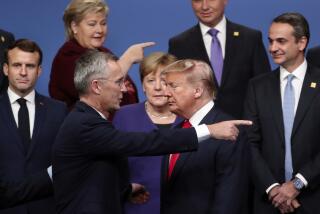Europe Is Skeptical on Reagan Conversion
- Share via
Until the last two weeks the Republic of the Philippines had not impinged greatly on the British consciousness. No distinct memory links the British with the Philippines as it does with other Southeast Asian countries such as Malaysia and Singapore.
With the notable exception of Spain, whose colonial control of the Philippines lasted longer than most other European colonies around the world, the same can be said for Great Britain’s European partners. Yet the Filipino presidential election and its dramatic consequences have been the lead item on British and European news programs day after day.
This was not just a desire to be in on the swiftly moving events in Manila. It also was a morbid curiosity--as it had been with Vietnam, Iran, Nicaragua and, most recently, Haiti--to see how the United States, heavily engaged in the area as it was, was coping. For Europeans, who have suffered from the pains of residual colonial commitments as well as from American carping at their manner of relinquishing them, there was a certain feeling of smugness in watching the United States struggle with one of its own imperial legacies.
Certainly Europe and the United States have different foreign-policy priorities. The United States is highly sensitive to events in the Caribbean and Central America, where the European governments by and large take a more detached view. Conversely, developments in Eastern Europe and the Mediterranean area have more immediacy for the West Europeans.
The Middle East provides a striking contrast, as illustrated by European-Arab interests and the U.S.-Israel connection. Most important, U.S.-European opinion diverges on the conduct of East-West relations and the nature and degree of the Soviet threat. This is not to deny that Europeans also differ among themselves on these matters, but the gap between the current U.S. Administration and most of the European governments is far wider.
To Europeans, the Reagan Administration’s policy of indiscriminate support for all political and social forces that declare themselves to be anti-communist seems simplistic and at times counter-productive. The Europeans have been reticent about endorsing the U.S. categorization of all those on its side in the ideological confrontation with the Soviets as belonging to the “West,” or the “Free World,” particularly when such categorizations seemed to make a mockery of the word “free.”
However, Europeans generally have been poor at sustained efforts to coordinate their opinions and interests and to ensure that their views are understood in Washington. The Asian Pacific region, unfortunately, comes well down the list of priorities on the European foreign-policy agenda.
Political developments in the region, apart from the peculiar problems of residual French responsibility in the South Pacific and British involvement in Hong Kong and Brunei, are seen as the United States’ responsibility--and, to a much lesser extent, Japan’s. They are no longer seen as a direct European interest. But a serious breakdown of stability in Southeast or Northeast Asia could not easily be ignored, as Vietnam could not be ignored, in large part because of the intensity of the domestic debate that the war triggered in Europe and the ultimate outflow of refugees.
Yet for most European politicians Asian issues are secondary. Human rights in the Philippines, South Korea or Indonesia arouse far less passionate debate in Europe than human rights in Chile or Argentina.
By almost opting out of the Asian Pacific region, the Europeans have in effect given tacit endorsement for the sake of stability to U.S. policies toward the “soft authoritarianism” of governments such as Ferdinand E. Marcos’ and Chun Doo Hwan’s in South Korea. However, unencumbered by the economic, strategic and emotional investment in the Philippines that the United States has had, Europeans have been able to take a more detached view once the post-election crisis had begun.
Thus Europeans were far quicker than the U.S. government to publicly support Corazon Aquino after the fraudulent election. But Europeans possessed far less leverage to secure a transfer of power. It had to be left to the Americans to pull the plug on Marcos.
Europeans have watched President Reagan, despite his emotional ties with Marcos’ strong anti-communist stance, apparently moving haltingly toward a position that democracy might be the best guarantee of security and stability. But they remain skeptical as to whether this really heralds a new approach.
For Europeans, suspicion remains that the Philippines, and for that matter Haiti, may be sui generis. Although in South Korea the government is worried, and the opposition inspired, by the recent events in the Philippines. But the day has not come when Europeans can expect the Reagan Administration to strongly pressure Seoul, much less even more repressive governments, for serious reforms--whether it be in Chile, Paraguay or even South Africa.
More to Read
Sign up for Essential California
The most important California stories and recommendations in your inbox every morning.
You may occasionally receive promotional content from the Los Angeles Times.













